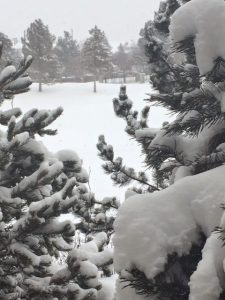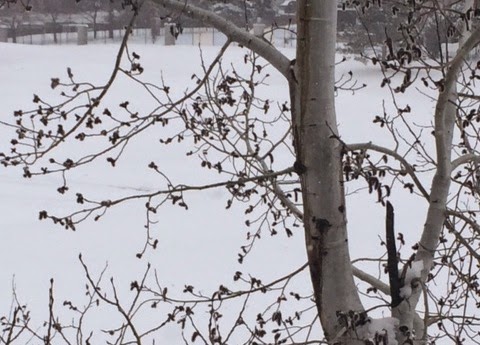In a survey that queried readers on their favorite season of the year, fall triumphed as the favorite season of Americans, with 29% responding that they prefer an autumnal climate. Spring and summer achieved enough votes to rank equally as preferences. As you could imagine, winter and its icy chill came in last place, preferred by only 7% of the people surveyed.
 When the first virgin snowflakes begin to fall or when you experience mild and infrequent wintry conditions, it is exciting, beautiful, magical, and oh such a wonder! But when you are confronted with cold temperatures, sunless skies, and feet of snow day after day after day, winter loses its novelty.
When the first virgin snowflakes begin to fall or when you experience mild and infrequent wintry conditions, it is exciting, beautiful, magical, and oh such a wonder! But when you are confronted with cold temperatures, sunless skies, and feet of snow day after day after day, winter loses its novelty.
Finding myself in the dead of winter in Colorado, with the mercury displaying single digits and nearly a foot of snow on the ground, I am tempted like many others in very frigid climates to complain about the cold, the snow, and the ice. Though many don’t like winter, the amazing rotation and tilt of our planet makes it inevitable. It is not only inevitable, it is necessary to the balance of our ecosystem.
Seasons exist not only in nature but within our lives as well. In addition to a sunshine filled, fruit producing season of summer and a bountiful harvest time of autumn, winter usually expresses itself at some point during our lifetime.
In the natural, winter is characterized by cold temperatures and reduced sunlight. Plants stop growing and animals hibernate and slow their heart rates and metabolisms. Reproduction during this time of the year is minimal because most young plants and animals could not survive.
What does winter look like in a person’s life? I believe that it can be characterized by loss and grief. It may involve relationship challenges. It might involve extended sickness or long term financial crises. Circumstances can appear dark, and we don’t seem to have ability to overcome them. Things that used to be fruitful for us may no longer be so. The beautiful things we have enjoyed can fade during this time, just as flower petals and leaves dry up and drop. This winter time period can be a season of low energy and our passions may dull during this time.
The seasons of our life don’t follow the annual timetable that we are used to in the natural realm. While a 3-5 month winter always signals a warming springtime, the winter season of life may extend for months or even years before a breakthrough comes.
How do you survive these sometimes long seasons of darkness and cold?
I believe that the natural gives us an indication of the spiritual. These are some keys to help you understand and survive the season of difficulty that we call the winter of our lives. It may come once or multiple times during your lifetime. It may be short and relatively easy, or it may prove to be a time that challenges you to keep your hope alive.
 1. Winter does not produce death, just dormancy.
1. Winter does not produce death, just dormancy.
In the natural realm, the trees and grass lose their lustre and leaves. They are not dead; they are merely dormant. Growth stops and they are resting. They slow their metabolism and conserve energy to survive. In like manner, though certain elements of our lives may feel dead at times, in the winter season they are only dormant. It is a great opportunity to rest from unusually busy and fruit producing seasons.
2. Winter reveals the parts of us that are not productive so that they can be pruned and removed.
As winter comes, the leaves and fruit drop from a plant, revealing spindly branches that are taking away precious nutrients and energy while not bearing any fruit. One description for pruning a hibiscus plant says to, “Remove any weak, diseased, or dead growth, as well as crossing or leggy branches. Branches that are growing toward the center of the plant should also be removed.” It’s interesting that self-centeredness is sometimes one of the issues that comes up during a winter season of life. We must allow the dead and non-fruit bearing parts to be stripped away so that we can focus on the positive, life filled parts. It may feel painful at first, but the future result be will more energy and more fruit. If you find yourself in a winter season, allow your life to be purged of negative or bitter elements so that only living vital parts remain.
3. Winter produces snow, an important source of water that will later nourish and encourage growth.
Snowflakes are one of the beautiful, magical attributes of winter. In spring, a rain shower is refreshing and produces a bright shiny reminder of growth. In winter, snow creates a picturesque display of purity and serenity. Snow, however, is also bitterly cold and sometimes dangerous. We must remember that this moisture is vital to what will occur in the next season of life. There are hidden seeds that have been planted in our lives that we may have been unaware of. These seeds have been deposited in the soil of our hearts. During winter and the dormancy that it provokes, they will collect the important moisture they need and will later have the necessary elements to encourage growth once winter is over.
4. Winter can feel like a solitary journey.
Hibernation is an animal’s response to the colder temperatures. Winter in one’s life is often characterized by solitude, self-reflection, and quiet. Occasionally the solitude can morph into feelings of isolation. The key in this respect is to use the solitude to reflect and dig deeper. Prayerful meditation and journaling are a great ways to express thoughts and feelings during these times. These allow the expression of pain, difficulty or loss, and that expression can open up a door towards healing and regrowth. The end result of winter will be the source of new growth in the next season of life. Additionally, a season of not producing fruit allows regeneration of the essentials in your life. It allows healing and the ability for roots to deepen.
5. The depth of adversity that we experience during winter will not exceed what we can bear.
Plants and animals have different capacities to tolerate cold. It is a protective element designed by God in their genetic makeup to keep them from being exposed to more than they can bear. Likewise, He will not subject us to more than we can sustain if we ask for His help. In Matthew 11:28 Jesus says, “Come to Me, all who are weary and heavy-laden, and I will give you rest. Take my yoke upon you and learn from Me, for I am gentle and humble in heart, and you will find rest for your souls.” We may have a difficult burden to bear, but we can find rest and help in the person of Jesus.
6. Cold forces a lower activity level, and sometimes things even stop for a time.
That is ok. We do not always need to be busy “doing” at every point of our lives. Energy saved from lack of activity can be stored for later times. When you feel cold spiritually, you need to do what you can to stay warm. The ground of your heart may seem frozen and hard during this time. There are things going on underground that you can not see. Allow those things to be cultivated and prepared for a later revealing in the next season. Much of that activity will be hidden, however, in the secret places of your heart.
7. Darkness is prevalent in winter. Purposely expose yourself to the light.
In natural winters that are especially dark, not having enough sunlight can lead to nutritional deficiencies and depressed emotions. It is an effort to brave cold conditions to expose yourself to sunlight. It is also an effort in the winter seasons of life to find uplifting, energy producing light-filled resources. It is necessary to our well-being, however, to search out the Son of God who gives light and life. In the times when you can not find the light and when you can’t find your way, choose to stay with what you know. Sometimes staying where you are is the safest thing to do when you can’t see where you are going. During winter, you may not see the answers to your questions clearly. You may feel fear, grief and despair during these dark times. It is through the reflection, the questioning, and the soul searching solace that you will come into the light of spring.
8. As you go through a winter season, do not neglect the routine everyday things.
 A good friend of mine said that his routine during the winters in Cleveland, OH consisted of “Shovel, coffee, shovel, repeat.” Shoveling snow is one of the daily monotonous (yet necessary) jobs that one must do in the winter. It is dreary, it is boring, and the cycle repeats every time the snow falls again. Continuing to do the necessary ordinary parts of your life like taking care of yourself, resting, eating well, taking care of your family, going to work, maintaining healthy relationships, and simply doing what needs to be done will help you to get through the dark and difficult days of your winter.
A good friend of mine said that his routine during the winters in Cleveland, OH consisted of “Shovel, coffee, shovel, repeat.” Shoveling snow is one of the daily monotonous (yet necessary) jobs that one must do in the winter. It is dreary, it is boring, and the cycle repeats every time the snow falls again. Continuing to do the necessary ordinary parts of your life like taking care of yourself, resting, eating well, taking care of your family, going to work, maintaining healthy relationships, and simply doing what needs to be done will help you to get through the dark and difficult days of your winter.
9. When winter goes on beyond what you feel you can bear, take a break.
Many people in very dark wintry locations take a break from the cold and snow to go away to another place — somewhere warm that will re-energize them enough to get through the remainder of their winter. In a winter season of life, sometimes you need a break. Doing something that lifts your spirits can be life-giving and provide a boost to endure the rest of the winter.
10. Don’t neglect to see the beauty of winter.
For anyone who rarely sees the expression of winter in giant snowflakes and icicle lined wonderlands, there is a magic in the natural beauty of winter. In our lives as well, there is a beauty and even a purity that emerges are we are tested and tried. Additionally in the season of winter, there are two significant events that can be sources of joy and emotional sustenance: Christmas and Valentine’s Day. Recognizing the reality of Jesus during the winter of your life can bring a security and joy amidst difficulty. Additionally the love of God, shed abroad in our hearts, becomes real and evident throughout the dark days and even more so as winter nears the end of its chilly reign.
James 1:2 says that you should, “consider it all joy when you encounter various trials, knowing that the testing of your faith produces endurance. And let endurance have its perfect result, so that you may be perfect and complete, lacking in nothing.” Winter can work a beauty, strength, and faith in us that may not be gained any other way. That is a wonderful thing to remember during the cold, dark days of winter. Spring really is on the way.
“If we had no winter, the spring would not be so pleasant; if we did not sometimes taste of adversity, prosperity would not be so welcome.” — Anne Bradstreet
